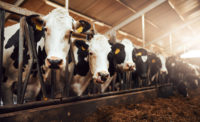U.S. Department of Agriculture has launched a partnership between USDA and bipartisan attorneys general in 31 states and the District of Columbia to enhance competition and protect consumers in food and agricultural markets, including in grocery, meat and poultry processing and other markets.
Through a framework established in consultation with the state attorneys general, this new partnership will assist state attorneys general in tackling anticompetitive market structures in agriculture and related industries that are raising prices and limiting choices for consumers and producers. Agriculture Secretary Tom Vilsack announced the partnership at the White House Competition Council meeting, which marked the second anniversary of President Biden’s Executive Order on Promoting Competition.
“By placing necessary resources where they are needed most and helping states identify and address anticompetitive and anti-consumer behavior, in partnership with federal authorities, through these cooperative agreements we can ensure a more robust and competitive agricultural sector," Vilsack said. "I’m pleased to see that a bipartisan group of states have committed to joining USDA in better protecting the fair and competitive markets that are a critical cornerstone of the American economy.”
Building on the “whole of government” approach outlined in President Biden’s Executive Order on Promoting Competition in the American Economy USDA issued a challenge to the state attorneys general to partner with USDA on competition in food and agriculture. This came after more than a dozen state attorneys general wrote to Vilsack requesting additional support for agricultural competition matters.
Under this new Agricultural Competition Partnership, USDA is investing in opportunities to combine state and federal authorities, expertise, and market insights. The agency is also leveraging funds to support complex cases and to jointly support research and academic work for use in future cases.
Focus areas of the Agricultural Competition Partnership include:
- Anticompetitive market structures and practices, as well as price gouging and other anti-consumer practices, in food, retail, meat and poultry processing, and other agriculture industries.
- Lack of choices for consumers and producers.
- Conflicts of interest, misuse of intellectual property, and anticompetitive barriers across the food and agriculture supply chains, such as in seed markets.
Specifically, this initiative will enhance the capacity of state attorneys general to conduct on-the-ground assessments of competition and consumer issues, enhance coordination between federal and state agriculture and competition authorities, create new and more independent research programs, and ultimately result in fairer and competitive markets and more resilient supply chains.
At the request of the states, USDA is partnering with the Center for State Enforcement of Antitrust and Consumer Protection Laws, a neutral, nonpartisan organization that provides similar support to the states. The State Center is establishing the necessary mechanisms for the attorneys general to cooperate with USDA. These mechanisms include an oversight committee to establish the project governance and transparency standards for the partnership, and a project selection advisory committee that will review project requests and recommend approval. Both committees will be composed of participating state attorney general offices. Additionally, USDA has engaged the American Antitrust Institute to be a resource for the states on this project.
All States are eligible to join by sending a letter of intent to participate to USDA. States can join or depart at any time. Only participating partners can qualify for funds or serve on the committees. A list of the states participating in the cooperative agreement is available on the AMS Fair and Competitive Markets webpage.
At the White House Competition Council meeting, Secretary Vilsack also discussed USDA’s recent investments to increase independent meat and poultry processing capacity, expand market opportunities for farmers, and support a growing workforce in rural areas. He further highlighted USDA’s plans to issue and finalize a suite of rulemakings under the Packers and Stockyards Act to protect farmers and ranchers from abuse.
Source: USDA




Report Abusive Comment